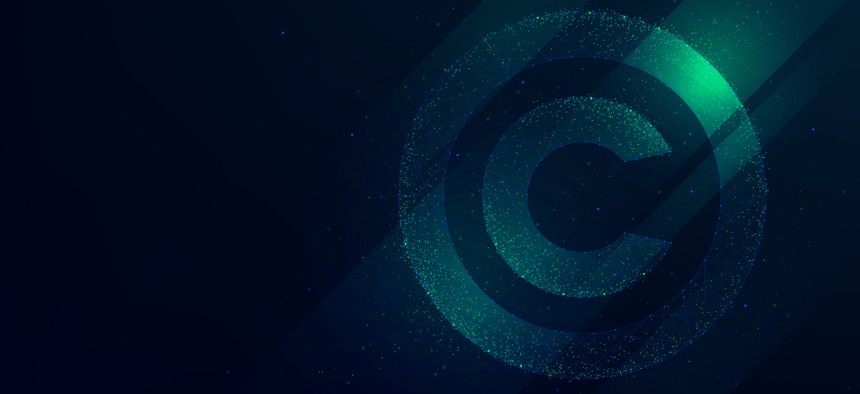Library of Congress probes the many collisions of copyright and AI

Maxger/Getty Images
The Copyright Office has questions about how protections do — or don’t — apply to AI-generated works.
The question of non-human authorship was, until very recently, something of an edge case for the U.S. Copyright Office, housed at the Library of Congress.
No more. Last year, two separate copyright registration cases pointed to the potential for generative artificial intelligence to upend questions of authorship. In one instance, the Copyright Office declined a grant of copyright to a work of art created solely by AI, on the grounds that it was made "without any creative input or intervention from a human author."
In another instance, a graphic novel with human-written text and AI-produced artwork was awarded copyright protection for the text and the placement of the images as they relate to the text — but not to the images themselves.
The Copyright Office ruled that "where a human author lacks sufficient creative control over the AI-generated components of a work, the human is not the 'author' of those components for copyright purposes."
This requirement of human authorship, supported by legal precedent and longstanding practice, was upheld in a federal court decision earlier this month.
In her ruling, District Court Judge Beryl A. Howell noted that "the increased attenuation of human creativity from the actual generation of the final work will prompt challenging questions regarding how much human input is necessary to qualify the user of an AI system as an 'author' of a generated work, the scope of the protection obtained over the resultant image, how to assess the originality of AI-generated works where the systems may have been trained on unknown pre-existing works, how copyright might best be used to incentivize creative works involving AI and more."
These are precisely the questions the Copyright Office is looking to answer as volume and ubiquity of content generated by AI grows.
In a Federal Register notice set to publish on Wednesday, the Copyright Office is looking for input from the public on questions designed to develop more settled policy on AI-generated work and to prompt Congress to legislate how this material is treated for the purpose of copyright protection — and whether and how to protect the creators of content on which generative AI applications are trained.
The Office is seeking input specifically on an issue of interest to content creators: whether the developers of generative AI applications may ingest copyrighted material without prior permission or compensation. Additionally, the notice asks for guidance on cases in which AI applications produce outputs that are designed to resemble the work of specific individuals — whether musicians, visual artists or others.
There's also the question of human control over AI applications. The Office wants to know if there should be specific carve-outs for AI applications which allow the user to control the set of inputs used in content creation. Relatedly, the Office seeks guidance on whether there should be a universal mechanism by which content creators can opt out of having their work ingested by generative AI systems.
Then there is the perhaps thornier question of governance: Who establishes an opt-out mechanism? Who develops compensation schemes for works ingested into AI systems? Who should pay the price in the event of an infringement — an individual creator or the entity that fields the AI system that permitted the infringement to take place? The Office asks whether Congress should set up a "compulsory licensing regime" analogous to the system in place in the music industry.
The Aug. 30 notice comes on the heels of public listening sessions conducted by the Copyright Office in the spring and summer that sought comments from academics, artists, technologists, trade associations and others on how AI and copyright potentially collide in the fields of software development, journalism, video gaming, visual arts and music.



